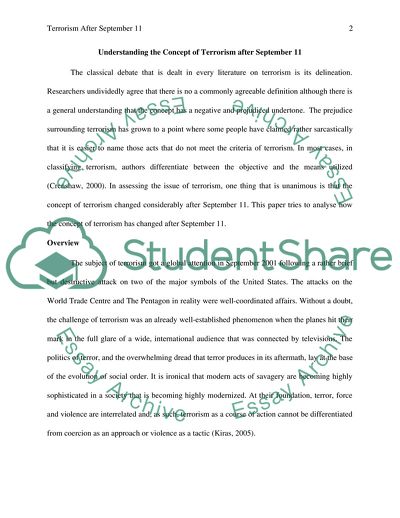Cite this document
(Understanding the Concept of Terrorism after September 11 Essay Example | Topics and Well Written Essays - 1500 words, n.d.)
Understanding the Concept of Terrorism after September 11 Essay Example | Topics and Well Written Essays - 1500 words. https://studentshare.org/social-science/1826432-to-what-extent-has-our-understanding-of-terrorism-changed-since-september-11th-2001
Understanding the Concept of Terrorism after September 11 Essay Example | Topics and Well Written Essays - 1500 words. https://studentshare.org/social-science/1826432-to-what-extent-has-our-understanding-of-terrorism-changed-since-september-11th-2001
(Understanding the Concept of Terrorism After September 11 Essay Example | Topics and Well Written Essays - 1500 Words)
Understanding the Concept of Terrorism After September 11 Essay Example | Topics and Well Written Essays - 1500 Words. https://studentshare.org/social-science/1826432-to-what-extent-has-our-understanding-of-terrorism-changed-since-september-11th-2001.
Understanding the Concept of Terrorism After September 11 Essay Example | Topics and Well Written Essays - 1500 Words. https://studentshare.org/social-science/1826432-to-what-extent-has-our-understanding-of-terrorism-changed-since-september-11th-2001.
“Understanding the Concept of Terrorism After September 11 Essay Example | Topics and Well Written Essays - 1500 Words”. https://studentshare.org/social-science/1826432-to-what-extent-has-our-understanding-of-terrorism-changed-since-september-11th-2001.


